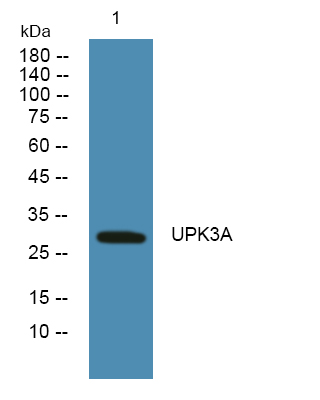UPK3A Polyclonal Antibody
- 货号:YN2450
- 应用:WB;ELISA
- 种属:Human;Mouse
- 蛋白名称:
- Uroplakin-3a (UP3a) (Uroplakin III) (UPIII)
- 免疫原:
- Synthesized peptide derived from human protein . at AA range: 232-281
- 特异性:
- UPK3A Polyclonal Antibody detects endogenous levels of protein.
- 组成:
- Liquid in PBS containing 50% glycerol, and 0.02% sodium azide.
- 来源:
- Polyclonal, Rabbit,IgG
- 稀释:
- WB 1:500-2000 ELISA 1:5000-20000
- 纯化工艺:
- The antibody was affinity-purified from rabbit antiserum by affinity-chromatography using epitope-specific immunogen.
- 储存:
- -15°C to -25°C/1 year(Do not lower than -25°C)
- 背景:
- This gene encodes a member of the uroplakin family, a group of transmembrane proteins that form complexes on the apical surface of the bladder epithelium. Mutations in this gene may be associated with renal adysplasia. Alternatively spliced transcript variants have been described.[provided by RefSeq, Nov 2009],
- 功能:
- disease:Defects in UPK3A are a cause of renal adysplasia [MIM:191830]; also known as renal agenesis or renal aplasia. Renal agenesis refers to the absence of one (unilateral) or both (bilateral) kidneys at birth. Bilateral renal agenesis belongs to a group of perinatally lethal renal diseases, including severe bilateral renal dysplasia, unilateral renal agenesis with contralateral dysplasia and severe obstructive uropathy.,function:Component of the asymmetric unit membrane (AUM); a highly specialized biomembrane elaborated by terminally differentiated urothelial cells. May play an important role in AUM-cytoskeleton interaction in terminally differentiated urothelial cells. It also contributes to the formation of urothelial glycocalyx which may play an important role in preventing bacterial adherence.,similarity:Belongs to the uroplakin-3 family.,subcellular location:Heterodimer formation
- 细胞定位:
- Endoplasmic reticulum membrane ; Single-pass type I membrane protein . Heterodimer formation with UPK1B is a prerequisite to exit out of the endoplasmic reticulum (ER). .
- 组织表达:
- Expressed in ureter.

- Western blot analysis of lysates from KB cells, primary antibody was diluted at 1:1000, 4°over night




